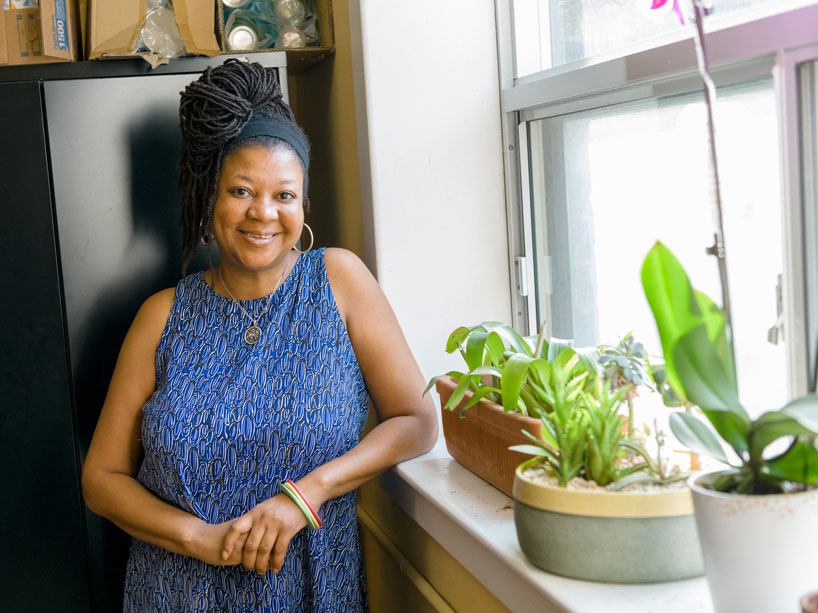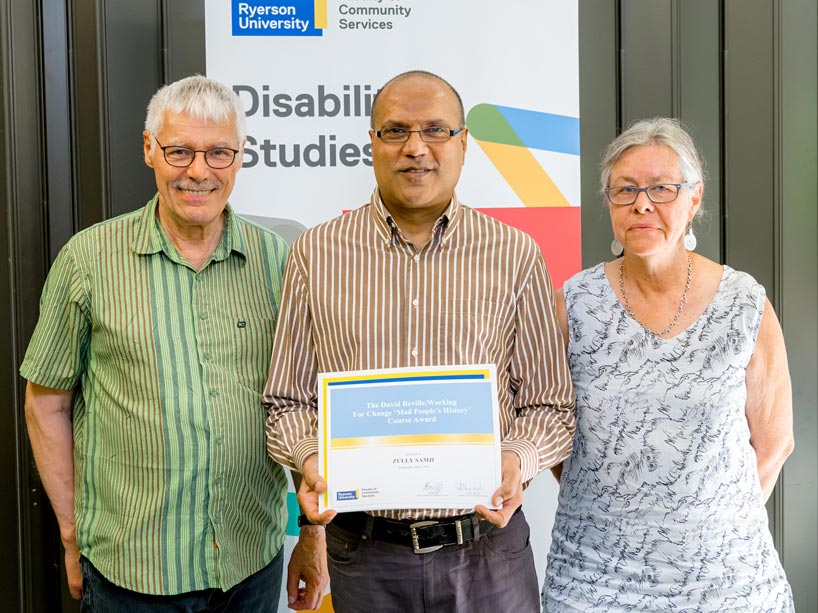Disability Studies award carries David Reville’s legacy

Photo: Dawnmarie Harriott was the first recipient of the School of Disability Studies’ David Reville/Working for Change Mad People’s History Course Award. Photo by Clifton Li
In a political career that spanned from 1980 to 1996, David Reville served as a city councillor, MPP, advisor to Premier Bob Rae, and chair of the Ontario Advocacy Commission. He was also one of the first Canadian politicians to be public with his personal mental health history. From 2004 to 2014, he brought his whole life experience to Ryerson as a teacher at the School of Disability Studies, where he helped create two courses (History of Madness, Mad People’s History) and helped foster the school’s abiding philosophy: that people with histories of mental health and addictions are not specimens to be studied, but have knowledge to impart.
Reville retired in 2014, but his philosophy carried on in the school’s David Reville/Working for Change Mad People’s History Course Award. The award pays the tuition fee for a member of Working for Change (external link) (a street-level organization that provides employment and training opportunities for people marginalized by mental health/addiction challenges) to take the online Mad People’s History course. Through the award, participants have access to a university course, and come to better understand and reclaim their collective history.
“It reaffirms the whole underpinning of Mad People’s History,” says David Reville. “It’s a course based on the stories of people with mental health and addiction challenges. By creating this bursary, we’ve been able to bring into the university people with mental health and addiction challenges who might not otherwise be taking university courses at all.”
“The notion is to start from labelled people—people who have actually had the experience of being psychiatrized—and bring that knowledge forward as legitimate,” says Kathryn Church, director of the School of Disability Studies. “David taught it with his fabulous combination of knowledge: policy knowledge, political knowledge, but also having lived it.”

Photo: Zully Samji (with David Reville and Joyce Brown, executive director of Working for Change) is this year’s recipient of the School of Disability Studies’ David Reville/Working for Change Mad People’s History Course Award. Photo by Clifton Li
First introduced in 2014 as a 70th birthday present for Reville, the $800 bursary has been funded every year out-of-pocket by a small group of “Friends of David Reville.” This year was Reville’s 75th birthday, and to mark the occasion, the School of Disability Studies launched a fundraising campaign to permanently endow the award. The fundraising goal was set at $25,000, but thanks a network of friends, family, colleagues, and donors, the funds raised have reached over $33,000. The donations—which came in both small and large amounts—included contributions from the Deans of FCS and the Chang School, the President’s Office, and a “Friends from Scotland” gift—a testament to Reville’s international reach as an activist.
“Ryerson awards usually go to Ryerson students,” says Church. “What we’re trying to do is bring people into an educational opportunity that they’re really shut out of. That’s a David Reville idea: let’s find out who’s excluded and try to create a pathway where they can actually get access to the work that we’re doing here.”
Dawnmarie Harriott, the Voices from the Street co-ordinator at Working for Change, was the first award recipient in 2014. Harriott’s struggle with mental health and addiction issues reached a turning point in 2007, when she signed up for a 12-week leadership program with the organization. “My eyes were opened up to so much,” remembers Harriott. “I didn’t know about the world around me because I was so isolated. More than that, I stopped blaming myself for my situation and understanding it was systemic: 15 other people around the table were facing the same things with different pathways. It was very empowering, with all of us supporting each other.”
Now, she supports people in sharing their stories, gives talks about her experiences, and advocates for policy change. The Reville award was a milestone in her career. “I had never had the opportunity to have a background in education,” she says. “I identify as somebody with mental health issues, but I also work with people with mental health and addiction issues. This was a great way for me to get to learn the history so I could be more educated in the work that I do.
“I’m more knowledgeable and more able to hold a conversation with certain terminology or certain concepts. The Mad People's course has enabled me to not only facilitate better when I’m coordinating a group, but also be more involved in my work on committees.”
For David Reville, Harriott represents everything the award can help foster. “I know Dawnmarie quite well because I’m on the board of Working for Change. She was a particularly strong candidate, and I’ve watched her development. It’s been extremely gratifying to see.”
Support the David Reville/Working for Change Mad People’s History Award.